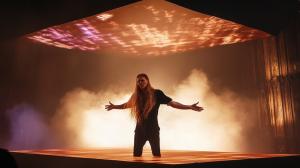

Matthew Blakemore challenges generative AI sustainability myths through revolutionary, cost-effective music video production
— Matthew Blakemore
LONDON, UNITED KINGDOM, September 18, 2024 /EINPresswire.com/ — Award-winning filmmaker Matthew Blakemore has unveiled a groundbreaking music video “Glitter Tsunami (Love, Peace & Sequins)” showcasing the creative potential of AI-assisted artistry.
AI Meets Eurovision: A New Frontier in Music Video Production
Launched at the International Broadcasting Conference (IBC) in Amsterdam, the project challenges misconceptions about AI in creativity and highlights AI-driven sustainability.
Created on a budget of £600, “Glitter Tsunami” demonstrates how AI empowers artists to produce high-quality content with limited resources. Blakemore wrote the song lyrics and storyboarded the video using traditional methods, then utilised various AI tools to bring his vision to life.
The video features over 35 references to Eurovision entries, from recent winners like Nemo and Loreen to acts like Daz Sampson and Scooch, celebrating the contest’s history.
AI-Driven Production: A Sustainable Approach
The project employed AI across multiple aspects of production, reducing costs and environmental impact:
Music Generation: Over 100 AI-generated song iterations were created using state-of-the-art tools, consuming about 0.7742 kWh of energy.
Sound Effects: Generated 840 AI sound effects to find the right sounds; only 42 were used, consuming 0.3252 kWh with advanced audio synthesis platforms.
Visual Content: Produced over 15,000 AI-generated images and 1,000+ video clips, consuming an estimated 60.405 kWh.
Total energy consumption was approximately 61.5044 kWh, equivalent to charging 5,125 smartphones or running a refrigerator for about 2.5 days.
Blakemore commented: “While AI content generation consumes energy, it’s crucial to compare it with traditional methods. A typical shoot involves travel, lighting, and post-production, consuming much more energy. We need to consider the full environmental footprint when assessing new technologies.”
Estimates suggest a traditional music video could consume 1,000 to 10,000 kWh or more, depending on scale. This means the AI-assisted production’s energy use is potentially under 6% of a conventional shoot.
Award-Winning Filmmaker and Songwriter
Blakemore’s creative journey began before generative AI. His artwork featured on the Tate Modern website, and he earned over 10 commendations in the UK Songwriting Contest using traditional methods.
Contrary to misconceptions that AI users lack creativity, research shows generative AI can enhance human creativity by up to 25%. Blakemore’s work exemplifies this synergy.
Bridging Traditional and AI-Assisted Creativity
In 2023, Blakemore’s AI-generated films “AI Awakened” and “What is Creativity?” won over 20 IMDb-certified awards, including at the Cannes World Film Festival. His expertise demonstrates AI’s potential to augment, not replace, human creativity.
“Glitter Tsunami” showcases rapid AI advancement, with current models producing up to 10 seconds of high-quality video—a significant improvement. This progress extends to music creation, reshaping traditional methods.
The Evolution of Music Production and Creativity
Music production has become formulaic and expensive, following repetitive patterns that stifle innovation. A 2012 study by Serrà et al. found that chord and melody variety in pop music declined by about 50% since the 1960s, while timbral diversity decreased by approximately 20%, highlighting a move toward uniformity. Research by Music Radar shows pre-recorded loops are used in 65% of contemporary pop songs, and the Music Producers Guild reports auto-tune and pitch correction tools are employed in about 80% of commercial productions. These practices suggest traditional methods have contributed to music homogenisation.
Over the years, AI-powered tools have become an increasingly intrinsic part of music production—even if some producers are reluctant to admit it. A 2021 IFPI report states 64% of music producers regularly use AI-powered tools. However, these traditional AI tools have not reversed the decline in musical diversity.
Generative AI is a new development that has the power to reshape music creation. It can reverse this decline by unlocking artists previously constrained by monetary limitations. For artists like Blakemore, generative AI enhances creativity rather than replacing traditional songwriting skills. A 2023 Berklee College survey found 78% of professional songwriters using AI tools reported increased productivity without compromising creativity.
Ethical Considerations and Industry Challenges
With the rise of generative AI, particularly models trained on vast datasets, concerns over training data licensing and ethical use have emerged. Blakemore addresses these: “Mandated upfront licensing of training data could limit innovation to the wealthiest companies, causing market monopolisation of powerful technology. These tools are transformative and don’t retain training data. It’s crucial we maintain open dialogue and consider multiple ethical perspectives in this rapidly evolving field. Strict licensing could lead to larger companies hoarding data, stifling innovation that could benefit humanity.”
A 2022 study in the Journal of Intellectual Property Law found 85% of AI music startups used some unlicensed material in training data. A 2023 WIPO report suggests strict licensing requirements could reduce AI music tech startups by up to 60%.
Regarding the AI Song Contest’s 2024 ban on generative tools Suno and Udio, Blakemore comments: “The contest’s stance is glaringly inconsistent, given that previous winners used AI tools trained on unlicensed data, including ChatGPT. This moral absolutism and selective gatekeeping not only silences valid ethical perspectives but also brings the contest’s validity into question.”
AI in Media: Amplifying Creativity and Sustainability
Despite ethical debates, Blakemore remains optimistic about AI’s future in media. “We’re witnessing rapid acceleration in AI adoption,” he notes. “Recent reports show most media companies are increasing AI investments. This isn’t just about boosting efficiency; it’s about revolutionising creativity and sustainability.”
Blakemore emphasises AI’s transformative potential: “By streamlining resource-intensive processes, AI could substantially reduce our industry’s carbon footprint. These tools democratise content creation, allowing diverse voices to bring their visions to life. We’re not replacing human creativity—we’re amplifying it and making our industry more inclusive and sustainable.”
Looking ahead, Blakemore concludes, “The future of AI in entertainment is bright. As we navigate the ethical landscape, we’re unlocking unprecedented opportunities for innovation, sustainability, and creative expression. This technology isn’t just changing how we work; it’s redefining what’s possible.”
Matthew Blakemore
AI Caramba Limited
+44 20 8079 2926
email us here
Visit us on social media:
LinkedIn
Instagram
YouTube
TikTok
Other
Glitter Tsunami (Love, Peace & Sequins) Music Video
Legal Disclaimer:
EIN Presswire provides this news content “as is” without warranty of any kind. We do not accept any responsibility or liability
for the accuracy, content, images, videos, licenses, completeness, legality, or reliability of the information contained in this
article. If you have any complaints or copyright issues related to this article, kindly contact the author above.
![]()
Originally published at https://www.einpresswire.com/article/744069682/600-eurovision-inspired-glitter-tsunami-merges-human-ingenuity-with-generative-ai-cutting-energy-use-by-94
The post £600 Eurovision-Inspired ‘Glitter Tsunami’ Merges Human Ingenuity with Generative AI, Cutting Energy Use by 94% first appeared on The Offspring Session.
Art and Entertainment - The Offspring Session originally published at Art and Entertainment - The Offspring Session




